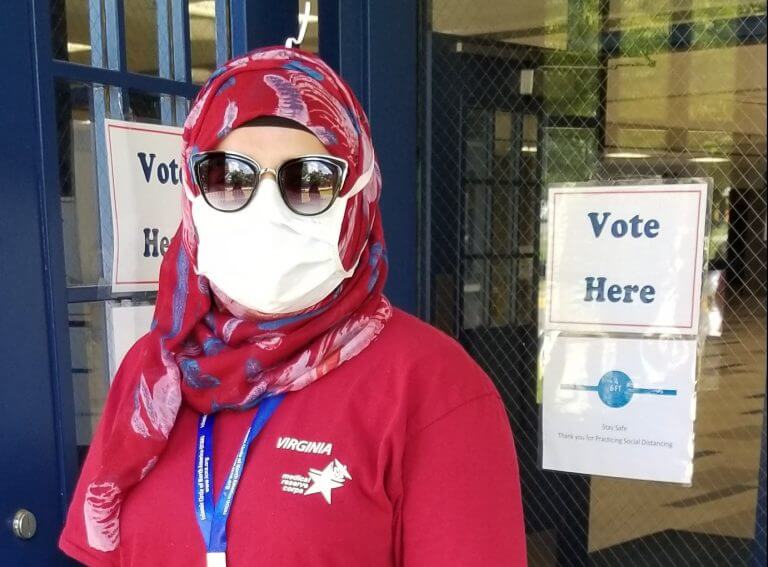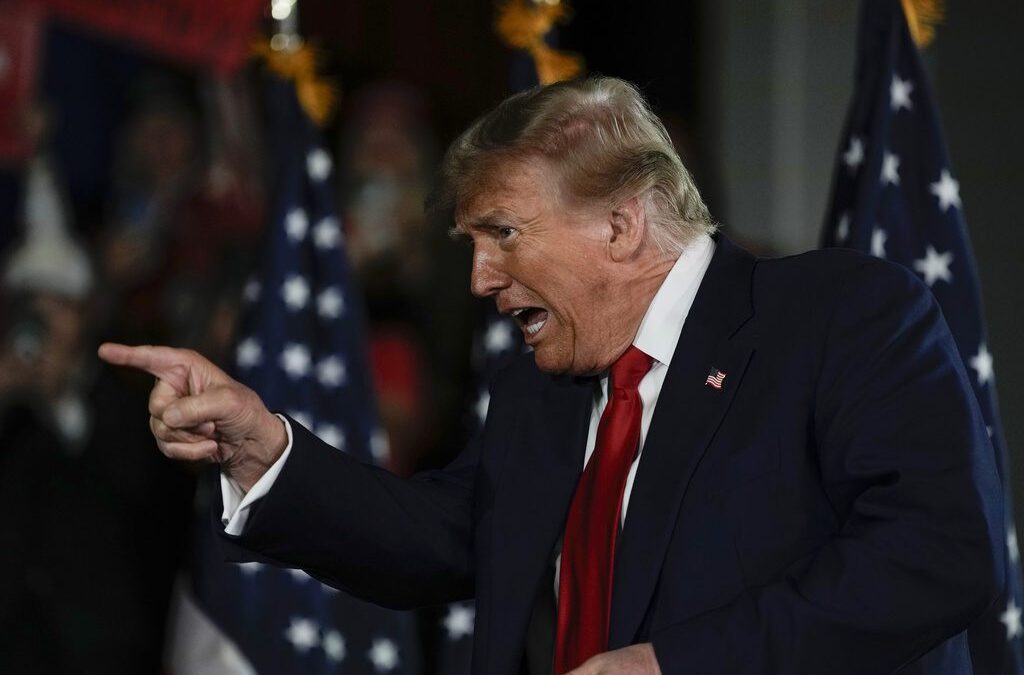
Medical Reserve Corps volunteers will be at the polling precincts today, helping election officials maintain COVID-safe practices. Contributed photo.
Volunteers work to tackle the threat of COVID-19 during a general election.
RICHMOND – If there’s someone in a red shirt standing by the polls today, it doesn’t necessarily mean they’re voting Republican. It could mean they’re one of approximately 900 volunteers who are members of the Medical Reserve Corps, a band of individuals passionate about health.
Some MRC volunteers have medical degrees, while others don’t. Letters behind a person’s name aren’t necessary for a spot in the MRC, simply a fervor for fever prevention – and other healthy habits.
“The number one requirement for someone to serve as a volunteer is that they’re passionate about public health,” said Jennifer Freeland, Virginia Department of Health (VDH) state volunteer coordinator. “Really, they have to have a heart for their community, and really have a heart for making their community healthy and safer.”
The VDH’s MRC started in 2002, but many people first came into contact with the corps following the novel coronavirus’s spread in the spring.
Throughout the spring and summer, the MRC assisted precincts holding elections and primaries in Virginia. The volunteers helped educate election staff and voters about safe practices during the COVID-19 era.
Today, they’re in approximately 50 localities – with the highest MRC volunteer concentration around Roanoke – helping voters all across the state cast a ballot safely in-person.
MRC volunteers will encourage voters to use masks and hand sanitizer and help staff and voters remember to maintain at least six feet of physical distance. They also help reduce transmission of germs by keeping doors propped open where possible, minimizing the number of surfaces voters touch, promoting area ventilation and helping folks safely enter and exit the building.
Developing a sanitation plan
Polling precincts will look a little different this year. Besides the Plexiglas partitions appearing at nearly every Virginia location, the MRCs will help encourage personal health precautions.
“All of the local election officials have developed, I believe they’re calling it, a sanitation plan,” Freeland said. “That hasn’t been done statewide [before].”
The MRC volunteers worked closely with the VDH and Virginia Department of Elections on the Election Day preparations, following Centers for Disease Control and Prevention COVID-19 guidance. They helped precincts learn about and secure proper cleaning supplies and educated staff about proper cleaning practices.
“Our MRC volunteers are not there to actually do the cleaning, but they’re there to make sure that the cleaning’s done correctly and frequently,” Freeland said.
Also, just because a voter doesn’t see an MRC volunteer at the polls doesn’t mean they haven’t been there.
“The volunteers won’t be necessarily at the polls. Sometimes they will be. It depends on what the local elections officials have requested,” Freeland said. “Some of our volunteers have actually done training for the election officials several weeks ago to teach them how to do it properly.”
Other volunteers arrived months in advance.
“I think what’s really nice is, of course, we did May, June and July, so this is our fourth deployment,” Freeland said. “Some of the localities, we supported them in June, did the education. They said, ‘You know what? We learned so much from you in June, we feel like we got a handle on this. So we don’t need you in November.’ Which I think is great. We’ve expanded their confidence in being able to create a COVID-safe voting environment.”
Keeping everyone safe
Having a dedicated volunteer for virus prevention also helps polls workers focus on their jobs without a looming distraction of contracting COVID-19. The MRC volunteers completed copious training, preparing for Election Day.
“They completed a training with the Virginia Department of Health and the Department of Elections. We had a two-hour training and then they also took additional online courses,” Freeland said. “We offered what we call an Infection Prevention Ambassador, which is our name for these rolls.”
Election Day certainly isn’t the MRC volunteer force’s first deployment. They’ve been active throughout the pandemic and before.
“Many of them have been performing as Infection Prevention Ambassadors in other settings, such as the testing events. They’re looking at it with the same lens as a testing event. Many of the volunteers have actually been working and making visits to long-term care facilities and making recommendations to prevent infection there. That’s a public health message that we do even beyond COVID. You know, the cover your cough, wash your hands, stay home when you’re sick, get your flu shot,” Freeland said. “It’s the same message we had for H1N1 10 years ago. It’s the same public health message. It has a little bit of a different spin because of COVID, but it’s a part of our mission.”
Not every locality requested an MRC volunteer. However, each received VDH guidance on pandemic precautions.
“They had sent out an email about guidelines. Of course, [we’re] going by it. [We’re] going by whatever the state board says,” said Reba Childress, Dickenson County general registrar. “We have gloves, we have these clear masks, we have the face masks, we have hand sanitizer, we have everything you can get. We have shields up in front of every desk between the voter and our poll workers.”
COVID or common cold
For those under the weather on or leading up to Election Day, there were a couple of voting options, according to Brookie Crawford, VDH’s public information officer for the central region.
First, those with certain circumstances could’ve requested an emergency ballot. That’s a ballot issued after the absentee mail-in requests stopped on Oct. 23 and after early voting culminated on Oct. 31, but before Election Day on Nov. 3.
Individuals under isolation or quarantine during Election Day could vote absentee, complying with isolation and quarantine guidelines, reducing the virus’s spread. An individual may cast an emergency absentee ballot if they were unable to meet the vote by mail application deadline for any of the following reasons: hospitalization or illness, the hospitalization, illness or death of a spouse, child or parent or another emergency justifying receipt of an emergency absentee ballot.
Requirements for emergency absentee voting include: requesting an emergency absentee ballot at any time prior to 2 p.m. on the day preceding the election, the general registrar providing the approved absentee ballot to the designated representative for the impacted person, marking the ballot in front of the designated representative while masked and distanced and the ballot only counting if the general registrar received it prior to polls closing.
Polling in a pandemic
The VDH released a four-part plan for safe voting practices on Election Day.
1. Make a plan. Visit the Virginia Department of Elections website for more information on options for voters in Virginia.
2. Wear a cloth face covering/mask, if you are able, at all times while voting.
3. Exercise proper social distancing by maintaining at least six feet of separation from other voters and poll workers. Consider staying more than six feet away from people who are not wearing cloth face coverings.
4. Practice good hygiene. Do not use physical greetings, such as handshaking. Wash your hands for 20 seconds with soap and water before and after voting. If soap and water are not available, use hand sanitizer to clean your hands. Finally, avoid touching your face and face covering.
Additional precautions
On Election Day, Freeland noted that people not wearing masks could still vote. However, she encouraged them to do so differently.
“If that polling location has the option for what we call curbside voting, you pull up, you text the phone number. They’ll come out and help you vote. So we encourage people who may not be able to wear a mask to do the curbside voting. Anything we can do, of course, to reduce spread, we’re going to do. You do the best you can with what you have,” Freeland said. “I think it’s really kind of all of our civic responsibility, really understanding that everyone has a personal responsibility for public health. ‘It’s not just about me, it’s about everybody.’ I hope that’s something that stays, you know, if people got that understanding of, ‘I can make a difference.’”
Freeland also noted that following Election Day, the VDH still needed additional MRC volunteers. Those interested may submit an application.
Amie Knowles reports for The Dogwood. She can be reached at [email protected]
Politics

VIDEO: Youngkin won’t add legal protection for birth control access
Access to birth control remains vulnerable to potential future attacks after Republican Gov. Glenn Youngkin effectively blocked a bill that would...

Trump says he would allow red states to track pregnancies, prosecute abortion ban violators
In an interview published by Time magazine this week, former president Donald Trump detailed his plans for a potential second term and said he would...
Local News

The zodiac signs of 12 iconic women offer insight into their historic accomplishments
Zodiac signs can tell you a lot about someone’s personality. Whether they’re an earth, water, air, or fire sign, these 12 categories (which are...

Virginia verses: Celebrating 5 poetic icons for National Poetry Month
There’s no shortage of great writers when it comes to our commonwealth. From the haunting verses of Edgar Allan Poe, who found solace in Richmond's...





